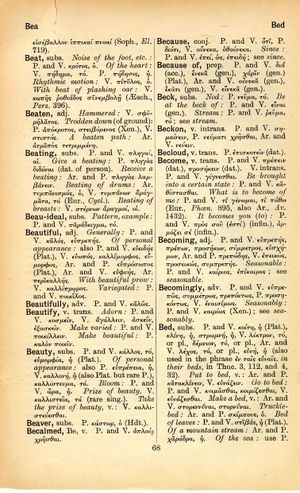become: Difference between revisions
From LSJ
Γάμει δὲ μὴ τὴν προῖκα, τὴν γυναῖκα δέ → Uxorem cape, non dotem, in matrimonium → Nimm bei der Heirat nicht die Mitgift, nimm die Frau
(Woodhouse 2) |
(CSV3) |
||
| Line 1: | Line 1: | ||
{{ | {{Woodhouse1 | ||
| | |Text=[[File:woodhouse_68.jpg|thumb|link={{filepath:woodhouse_68.jpg}}]]'''v. trans.''' | ||
P. and V. πρέπειν (dat.), προσήκειν (dat.). | |||
V. intrans. P. and V. [[γίγνομαι|γίγνεσθαι]]. | |||
<b class="b2">Be brought into a certain state</b>: P. and V. καθίστασθαι. | |||
<b class="b2">What is to become of me</b>: P. and V. τί γένωμαι, τί πάθω (Eur., <b class="b2">Phœn.</b> 895, also Ar., <b class="b2">A</b>v. 1432). | |||
<b class="b2">It becomes you</b> (<b class="b2">to</b>): P. and V. πρὸς σοῦ (ἐστί) (infin.), ἁρμόζει σέ (infin.). | |||
}} | }} | ||
Revision as of 09:22, 21 July 2017
English > Greek (Woodhouse)
v. trans.
P. and V. πρέπειν (dat.), προσήκειν (dat.).
V. intrans. P. and V. γίγνεσθαι.
Be brought into a certain state: P. and V. καθίστασθαι.
What is to become of me: P. and V. τί γένωμαι, τί πάθω (Eur., Phœn. 895, also Ar., Av. 1432).
It becomes you (to): P. and V. πρὸς σοῦ (ἐστί) (infin.), ἁρμόζει σέ (infin.).

